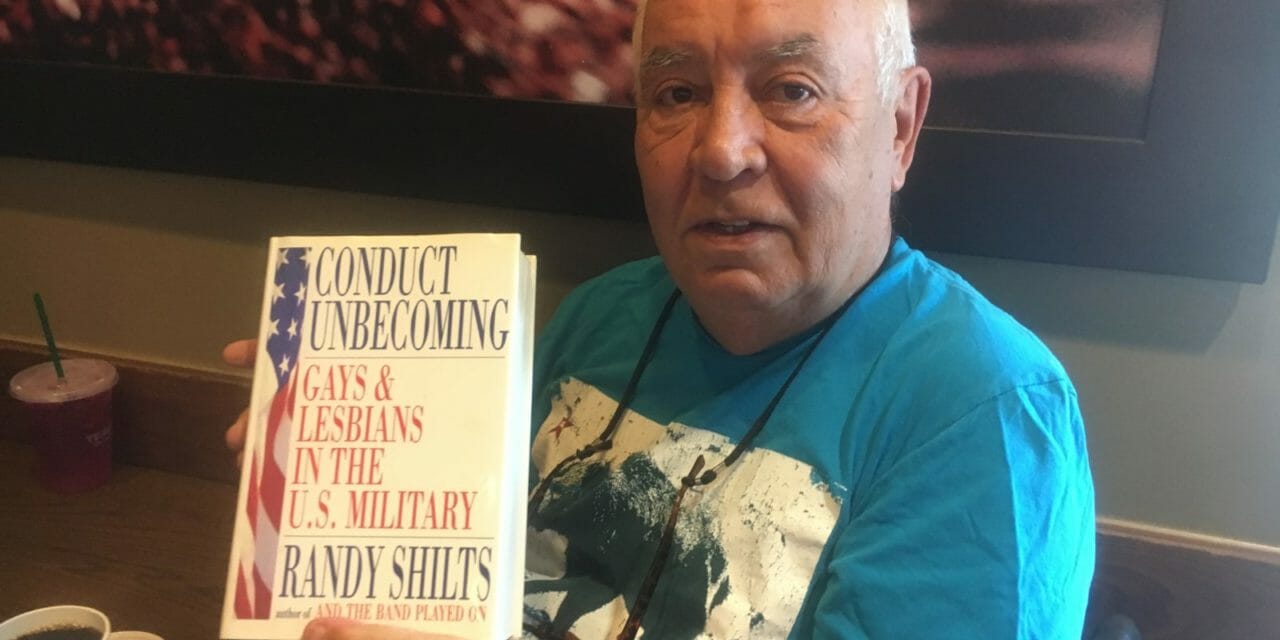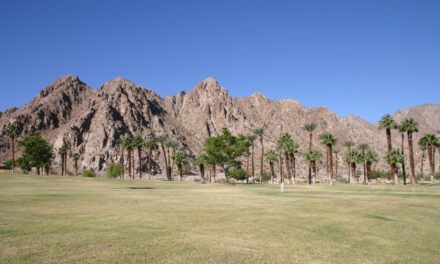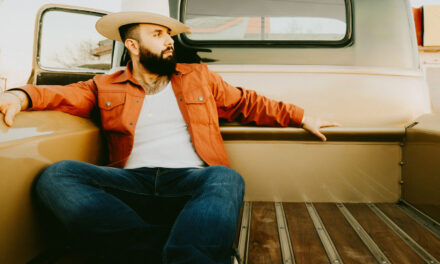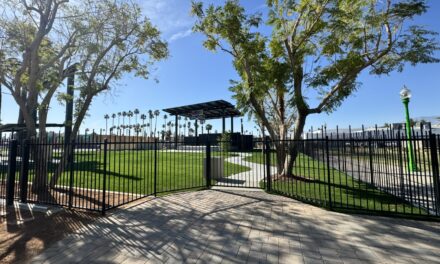CATHEDRAL CITY – The LGBTQ Veterans Memorial in Cathedral City has often been described as a granite obelisk. To define it simply as such, would do it a grave disservice. It gives voice to every lesbian, gay, bisexual, transsexual, and queer soldier who has ever served.
U.S. Air Force Sgt. Joe Hoyer, 72, of Cathedral City is one of those gay soldiers whose voice can be heard.
“It is an awareness that we served,” Hoyer told Uken Report. “It was difficult enough to serve under trying circumstances, but to serve especially when you’re not wanted was incredibly difficult.
Part of Hoyer’s story is included in Randy Shilts’ book, “Conduct Unbecoming – Gays & Lesbians in the U.S. Military.”
“That’s what they called it,” Hoyer said. “Who we were was considered conduct unbecoming.”
As an 18-year-old gay man, Hoyer enlisted in the U.S. Air Force. It was a pre-emptive move to avoid being drafted, he said.
“That was a one-way ticket to Vietnam,” Hoyer said.
He served in the U.S. Air Force from 1965-1969, his voice all but silenced when it came to his sexuality.
“I knew I was gay,” Hoyer said. “I should have been more nervous but I wasn’t. In boot camp, our instructor told us if any of us were gay to get out now because it would only be harder down the road. There were at least two other gay men that I know of. We just didn’t say anything. One guy took them up on their offer.”
The voice in his head told him to keep quiet – and he did.
“It was crazy times,” Hoyer recalled. “There were protests and upheaval. I didn’t know what it all meant if I left as a gay man. Would I get a job?”
NNoUnable to keep his voice silent, Hoyer confided in a few colleagues that he was gay, knocking them for a loop.
“”They simply did not believe it,” he said. “I was not what they thought a gay man should be like. I wasn’t the stereotype of a gay man. I wasn’t effeminate.”
To the extent that many LGBTQ soldiers kept quiet for receiving a less than honorable discharge, there was a subculture of gay military soldiers who told their commanding officers they were homosexuals in order to escape the rigors of war.
One of Hoyer’s “straight” friends, a man he calls ‘Glen,’ desperately wanted out and asked Hoyer if he would help him act “gay.” He saw a psychiatrist, learned how to cross his legs like a woman, soaked up effeminate moves, purchased John Lennon type glasses and more. He told his commanding officer that he was feeling alone and isolated.
“We laughed our asses off,” Hoyer said.
Glen eventually received a general discharge.
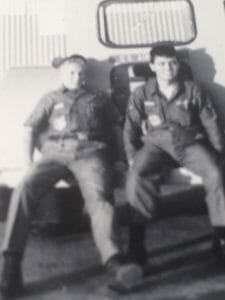
Joe Hoyer, on the right, and his roommate. “Notice how our legs are touching,” Hoyer said with a smile.
For Hoyer and other gay soldiers, they found comfort, companionship — and sometimes a voice – in bars where gay groups of men would congregate and socialize. He told of once meeting a gay man, who served as a navigator on Air Force One for the late President John F. Kennedy, and regaled them with tales of the late First Lady.
“There were so many gays,” Hoyer said matter-of-factly. “It was war time. They wanted bodies, so they overlooked a lot of things.”
Never, Hoyer said, was he or any of his gay colleagues bashed.
“I never saw it in the military,” he said. “We were all on the same team.”
He met his lifelong partner at a bar in Tucson, Ariz. It was like a scene out of a Hollywood movie.
“I saw John, he was cute, and we started flirting ….”
They were domestic partners for 26 years.
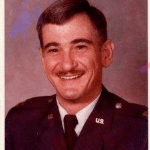
U.S. Air Force Capt. John Reese Evans II
His partner, U.S. Air Force Capt. John Reese Evans II, died at age 59 of lung cancer. Hoyer fought for three months to have his ashes buried in Arlington National Cemetery and finally prevailed.
As an officer in the U.S. Air Force, Evans was often invited to elegant affairs and formal functions. In order to keep suspicions at bay, Evans was routinely accompanied by a woman, also known in those days as a “beard.”
And, of course, Hoyer could not dance with his love at those formal occasions.
Hoyer’s voice was often absent at those events.
“I’m a pretty stoic person,” Hoyer said. “I let it roll off my back.”
The exception came at Evans’ retirement party. Evans’ mother sat on one side of him; Hoyer was on the other. The presiding officer would traditionally give the retiree his certificate and his wife a dozen roses to acknowledge her role in her husband’s career. At the conclusion of Evans’ ceremony, Hoyer unabashedly snatched a single rose from the centerpiece, declaring, “I want my rose.”
“I cooked, I shined his shoes, I ironed,” Hoyer said. “I wanted my rose.”
In that single gesture, he made his voice heard.
“It was a difficult time for those who were gay, but we served faithfully,” Hoyer said. “And now transgender soldiers are being persecuted,” Hoyer said. “It’s only a matter of time for gays if this guy (Trump) stays in office.”
In a historic move that will give voice to LGBTQ military veterans across California, Gov. Jerry Brown has signed into law AB 2439, Assemblymember Eduardo Garcia’s legislation designating Desert Memorial Park as the state’s official LGBTQ Veteran Memorial.
The successful passage of this measure makes California the first state in the United States of America to dedicate a memorial recognizing LGBTQ veterans.
Garcia told Uken Report that he was compelled to introduce the legislation after Tom Swann Hernandez, a local veteran and longtime advocate for the LGBTQ community who was instrumental in the original dedication of this memorial in 2001, brought this idea to him.
“A memorial of this nature is particularly significant following the years of discrimination faced by LGBTQ members in the military that over the course of time had often prohibited same-sex partners from attending and mourning for the loss of their loved ones during funeral services. This memorial became the first dedicated sacred space to pay respects and commemorate the service of LGBTQ veterans,” Garcia said.
AB 2439 was a bipartisan measure endorsed by the California Department of Veteran Affairs. Four American Presidents; Gerald Ford, Bill Clinton, George Bush and Barack Obama have sent formal letters recognizing the memorial.

